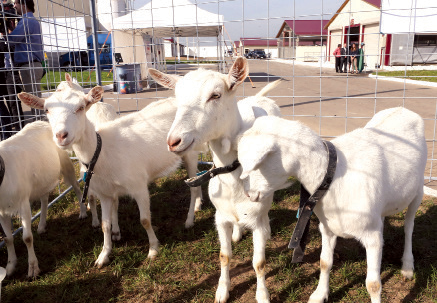Alexander Lukashenko not long ago approved a plan to create scientific and practical hubs, under the Academy of Sciences, enabling organisations engaged in similar research to efficiently share facilities and expertise, while testing the practical application of ideas. The President now intends to visit each, and began at the stockbreeding centre.

Processing of goat’s milk to generate human lactoferrin operational until the end of the year
From the beginning, the event turned into a working session, on the one side, and a scientific and practical discussion, on the other side. ZhodinoAgroPlemElita hosted the President’s tour, showing him its various spheres of activity.
Topic one: milk
It’s no surprise that some livestock breeders are using the very latest technologies. However, efficiency varies greatly, since so many elements are involved: the breed of animal, living conditions, feed, and, of course, level of staff training and responsibility. Most farms have already modernised the buildings in which animals are kept, and personnel have received training, but breed and diet remain to be improved.
The Director of the Scientific and Practical Centre for Animal Husbandry, at the National Academy of Sciences of Belarus, Nikolay Popkov, believes that some livestock are better suited to our climate than others. Accordingly, farmers cannot simply import from abroad and be ensured of success. The Animal Husbandry Centre is engaged in breeding dairy cattle better adapted to our conditions and already boasts a herd of 2-3 thousand cows, capable of yielding nearly 20 tonnes of milk annually. Scientists have set up mobile brigades who can promptly take DNA samples at necessary time so that the stock can be refined over several generations. Is it rationally? Won’t it be reasonable to see selective breeding farms in every district? Moreover, this task has been set up by the President but its fulfilment is hindered by a range of aspects. Legislation has yet been passed to ensure this, despite Mr. Lukashenko’s order for an enactment by October 1st.
Topic two: DNA
The debate regarding the advantages and disadvantages of genetic engineering continues. Meanwhile, scientists continue their research. Transgenic products are strictly regulated internationally of course, but valuable substances, taken from them, don’t differ from the originals. For example, this refers to human lactoferrin — useful for immunity and resistance to various diseases. Belarusian experts have managed to breed 50 goats able to produce milk containing a lactoferrin akin to that in human breast milk. The project has been a joint effort with Russia as part of a Union State programme, with support from President Lukashenko, as the Chairman of the Supreme State Council of the Union State. He is keen to see pilot production move to higher more intensive level of work by the end of the year.
Topic three: against circumstances
Nikolay Popkov notes that the recent epidemic of African swine fever has necessitated the replacement of livestock: a move the President wishes to see done quickly. Mr. Popkov believes that the creation of small farms is the way forward, despite some opposition from those who favour large complexes. Perhaps the two can exist side by side; having visited one such small farm, Mr. Lukashenko is convinced that small-scale projects can be successful, being able to pay for themselves within about a year.
Summary
If there’re various reasonable judgements each of them should be tried. Sometimes, the only way to test an idea is to see it in practice. Scientists may offer us innovations, but these have little relevance unless they can be applied in the ‘real world’. Ideally, our experts will not only conquer this challenge, but earn export revenue from sharing their farming technologies with countries far and wide.











